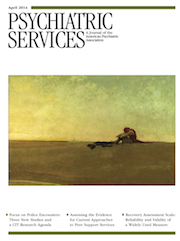Social Cognition and Interaction Training: Preliminary Results of an RCT in a Community Setting in Israel
Abstract
Objective
Social cognition and interaction training (SCIT) has shown promise in improving consumers’ social cognition and functioning, in both inpatient and outpatient settings. This randomized controlled trial examined the effectiveness of SCIT among persons with serious mental illness living in community settings in Israel.
Methods
Fifty-five participants in social-mentoring services were assigned randomly to SCIT with social mentoring or to social mentoring only. Emotion recognition, theory of mind, attributional bias, and social functioning were assessed at baseline (February 2010) and about six months later, upon completion of the intervention.
Results
Interactions between time of measurement and group were significant for theory of mind and social engagement. Emotion recognition by the SCIT group improved significantly, but the time × group interaction for this variable was not significant.
Conclusions
This study provides preliminary evidence that SCIT plus social mentoring improves social cognition and functioning among persons with severe mental illness who are living in the community.



